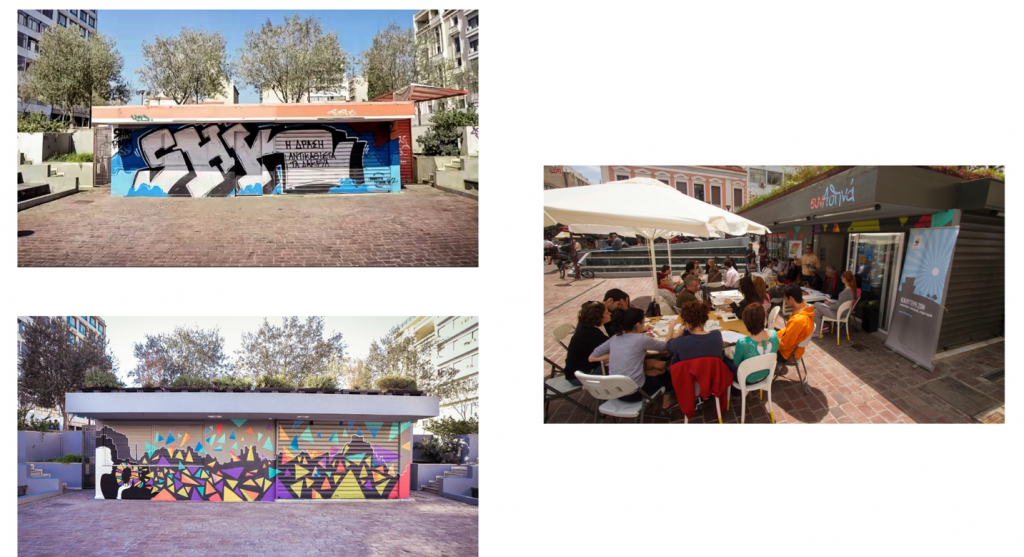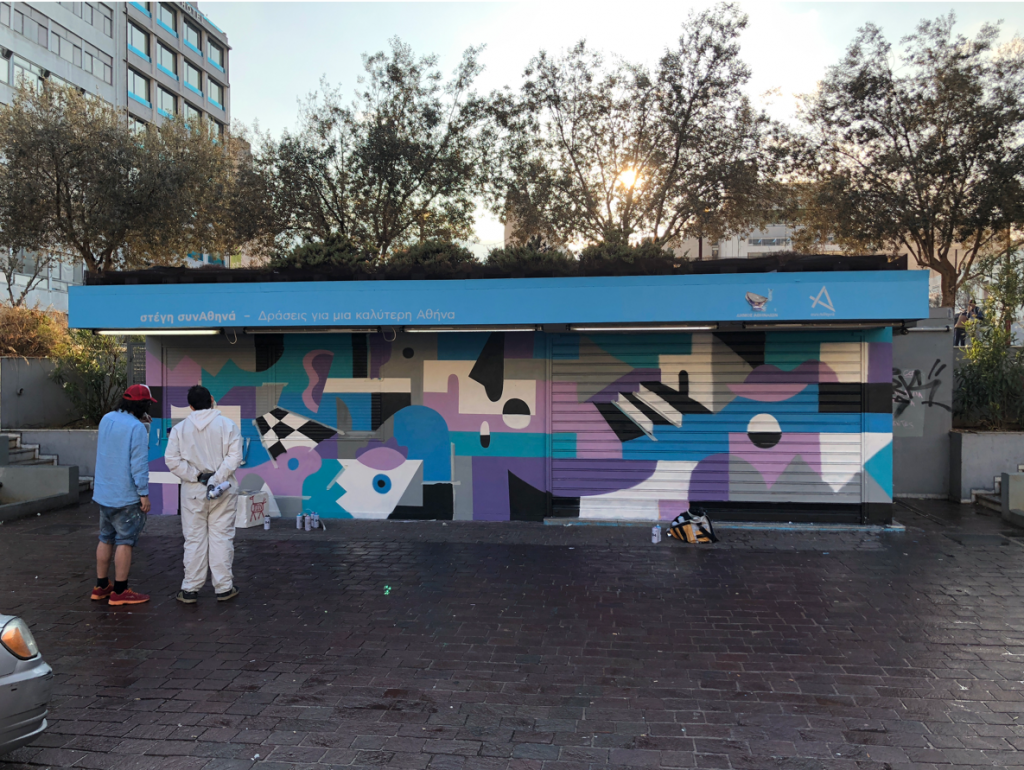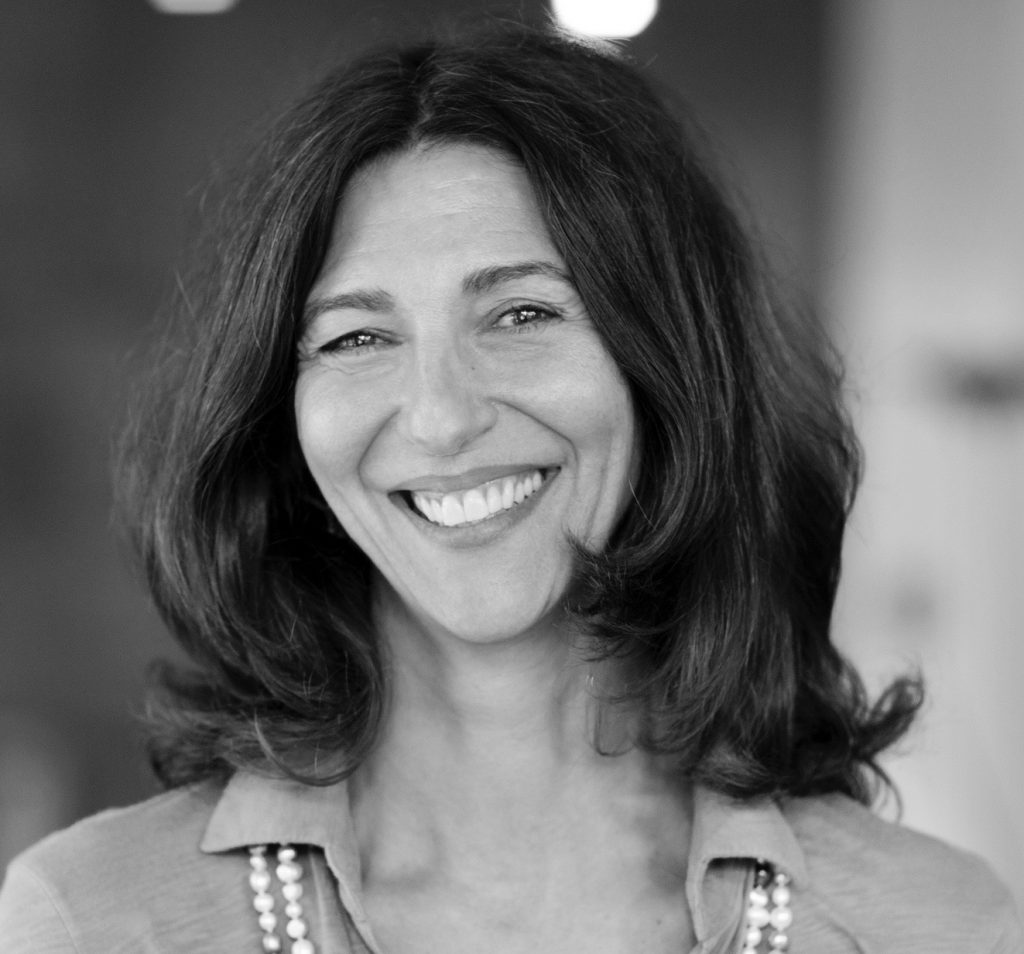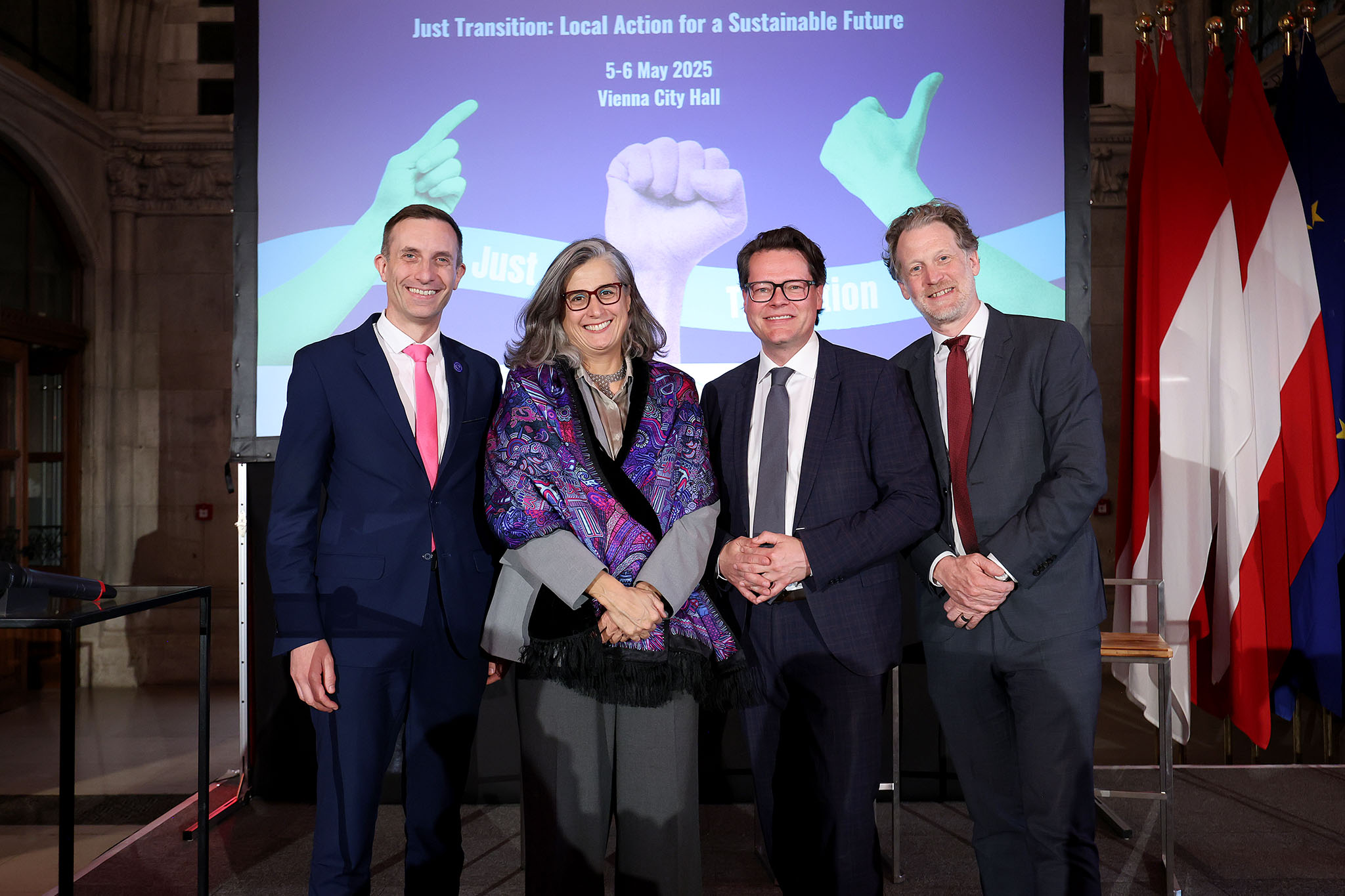synAthina connects the services of the municipality of Athens with formal and informal civil society groups. It began during a moment of crisis and is still going strong. We spoke with the project’s initiator and former Vice Mayor of Athens, Amalia Zepou.
What gave you the idea for synAthina?
Amalia Zepou: It was 2013 and Greece was facing a severe financial crisis. I was working as a filmmaker at the time and had just done a documentary about how the Olympic Games in Athens 2004 had impacted people’s perception of the city. I had developed an eye for what was happening here. I became active in many initiatives – informal ones and very spontaneous ones – that helped people who faced financial hardship and homelessness, took care of cleaning the garbage, redesigning parks, or guerilla gardening – there was a lot of guerilla gardening at that time. These initiatives gained momentum and started to regulate themselves. I was convinced that the municipality would benefit greatly if they came in contact with them.
So I went to the municipality and pitched the idea of this platform that would connect them to the public-spirited citizens of Athens who were already helping the city to stand on its feet. This is how it started.
What made you want to take the leap and join the municipality yourself?
Amalia Zepou: When I became more involved in activist groups, I put the camera away. The crisis was reaching such levels that I thought it was more important to help my neighbours than making documentaries.
I was very lucky to get elected in the municipal elections and I also submitted synAthina to the Mayors Challenge Award of Bloomberg Philanthropies. We won the award which came with 1 million euros and a lot of education on how to implement such projects in a local authority. So even though Athens was in a budget crisis at the time, we had the money and the resources to experiment with a new way of governing and addressing the problems locally together with the citizens.
How did the citizens react to the project?
Amalia Zepou: Something that might be fun to hear is that because I came from these community groups myself, when I pitched this idea to the mayor, some thought that I was moving into enemy grounds. Because, at the time, many activists were of course very disappointed with the institutions, the municipality, the parliament. It was a moment of political crisis. So when I became part of the city administration, many of my peers did not see it very positively. But through the years, many of them approached me and said, “Now I understand what you tried to do and I’m on board with you.” These were always very touching moments.
Could you tell us about the impact of synAthina?
Amalia Zepou: In total, the platform collected more than 4,000 activities and over 500 formal and informal groups. One of its most innovative aspects was that it included the informal capacity of civil society.
One lighthouse project involved an abandoned public market at the city centre. It had no resources to be managed after having failed businesswise. So we invited groups that had emerged from the platform to co-design a new concept for the market. This was the first example of participative governance in the city. It was completed in 2017 and now it runs.

A second flag project tackled the enormous amount of graffiti and tagging in Athens. Instead of treating the graffiti artists like enemies, we invited them and found a solution together. They were allowed to play with the city creatively. That was very much in the spirit of the platform.
A third lighthouse project that was completed only recently dealt with the integration of refugees. If you remember, 2016 was another year of crisis for Greece. More than a million refugees passed through Athens. synAthina became the platform that helped to include the refugees by supporting a new integration strategy. It gave refugees the capacity to learn the language, find a place to live and a job, and let them be part of city life. It allowed refugees to contribute something in exchange for the city’s services.

In the name synAthina I detect the word „synergy“. What was a surprising synergy that came about through the project?
Amalia Zepou: In Greek, syn Athina means “with the goddess Athena” and is part of a proverb that says: “the goddess will come with you if you help with your own hands.”
A good example for long-term synergies is the graffiti project: local shopkeepers wanted to come into the design of the anti-tagging strategy. Businesses developing their corporate social responsibility activities came on board. Kärcher, for instance. They turned out to be hero partners in the graffiti efforts. And then there were Greek foundations that were interested in a social innovation model for the city. That was very very interesting. So you had shopkeepers, you had businesses, you had foundations. And then, for the refugee integration programme, universities came forward to help us articulate the emerging methodology. This allowed us to scale our projects and transfer them to other problems and other cities.
If the Mayor of Vienna decided that he wants to do a similar project, what would be your advice for him?
Amalia Zepou: Across Europe, civil society has become much more dynamic during the last decades. Over the years, more than 30 city representatives have visited Athens to see how we were doing it. There are dozens, if not hundreds of mayors in Europe now who have already started to find ways to connect.
And today, compared to when we started synAthina, digital technology has evolved so much, which has amplified this process. Madrid, for example, Reykjavik even before us, Gent, Helsinki already have moved on to use digital platforms for local civil society.
I think that the most important thing is to have an ear and an eye for what the city does by itself, which is something that municipal officers don’t usually have the time to do. You know, to look into what it is that citizens are doing. Not what they are saying necessarily, but what they are actively doing for their own city.
It might be very small, like people helping their neighbours – we saw it with COVID, right now in Athens with the heatwave and the fires – there are hundreds of people and it’s touching to see immigrants and refugees helping the firefighters. This dynamism is incredibly valuable. Each city has its own and that is what the mayor has to love, really, in order to include it. Then they will find a way.
Do you remember specific challenges that you had to overcome to make this platform come to life?
Amalia Zepou: The largest barrier was the culture of the City Council. It was not at all used to sharing governance or assets of the municipality. They might say, “There is no law that supports what you are talking about.” But you don’t necessarily need a law, you need total transparency and new processes. So the main barrier was bureaucracy.
But because of the crisis and the extreme need of the time, we were able to try out new things and we managed to achieve a mind shift to include the people who are part of the solution. It was an important moment. It was innovative and experimental in an otherwise conservative bureaucratic municipality.
How has synAthina impacted the relationships in Athens?
Amalia Zepou: I noticed that city officials who used to be very suspicious of civil society and of activist groups gradually opened up. Some of them even started their own informal activist groups in their neighbourhoods in their spare time. These were the same city officials who were bureaucrats during the working week. This helped develop a culture of collaboration and communication between them.
Do you think this development has been spurred on by the pandemic?
Amalia Zepou: With every crisis, people in key positions in Greece became more familiar with this unpredictable state of affairs in which we are now as well. And they are forced to adopt new ways of trying out things. Cities cannot solve these new types of challenges if they don’t think differently. Today’s solutions have to include the people who are at the frontline of the city. You see this also with the types of programmes that Europe is funding at the moment. “Social innovation”, “Europe for citizens”, “participative modes of governance” are the keywords in the new programme phase of 2021 to 2027. So yes, things have changed.
Has synAthina developed in the way that you expected or hoped for? Was there anything surprising that turned out to be different than you expected?
Amalia Zepou: Well, when you leave your baby, it is a difficult moment. When I decided not to continue in 2019, I felt like the world was ending. But I was incredibly proud when I saw that synAthina was resilient enough as a system to be adopted by the next mayor, even though he came from a different party. Today there is more focus on the digital side and they are much more careful with the way they collect the activities, which is a good thing. I feel incredible satisfaction that synAthina can change and develop even in ways I had not imagined.
synAthina has won several awards. How did they impact your work, your reputation, and the success of the project?
Amalia Zepou: The most important thing about them and other recognitions, like the European Capital of Innovation Award, was that they came with knowledge. I didn’t even know the word innovation when I was winning those awards. I entered a world that helped me understand what I was doing in a way that could be communicated. Then I could share it with my colleagues and go further. So that was incredibly supportive.
On the other hand, those awards coming from outside are not necessarily very flattering in your day to day life. My colleagues would say, “What is this? We have to deal with today’s problems on an everyday level, and you give interviews and travel abroad to talk about what you’re doing?” It kind of clashed with the everyday reality of the local authority. Sometimes you have to be careful. Nevertheless, in the City Council, when I faced difficulties, I had that. I said, well, there must be something good about what we are doing if it is recognised by those institutions that are well established abroad. So, these awards helped me politically but not always in the way I wanted.
What were the best and worst aspects of being Vice Mayor of Athens?
Amalia Zepou: The best was how incredibly uplifting it is to work in the local authority. Politicians usually want to go to the top but I think that the bottom is the most dynamic place to be. I mean in a good sense, in the sense that you understand what people really go through, what they need, what they can do. It’s an enormous challenge for politicians to remain at the local level and that was thrilling for me.
The most difficult part and maybe the reason why I did not want to stay in politics is that there is also a political language that I was never able to control. I don’t know how to play the games and you have to learn to play those games. I’m not saying that games are not good. I’m saying that they are good, and you have to know exactly how they are played. I’m not good at that. I’m good at other things. So that’s why I left, to remain doing what I can do best.
Now, I have founded the NGO KOLLEKTIVA with some of my previous colleagues from the municipality. It is our mission to help municipalities in Greece and abroad to implement experimental projects with participative methodologies and cultural events. Culture in the widest sense in the principles of social innovation. And who knows what next.
Discover this project and many others in our Showroom of political best practice.
Main image: Amalia Zepou, photo by Claudia Leisinger



